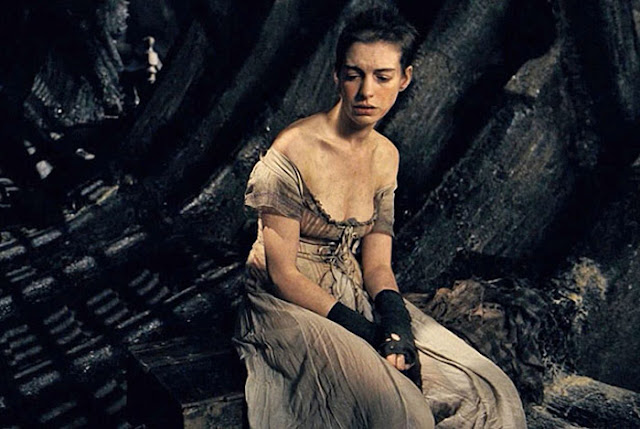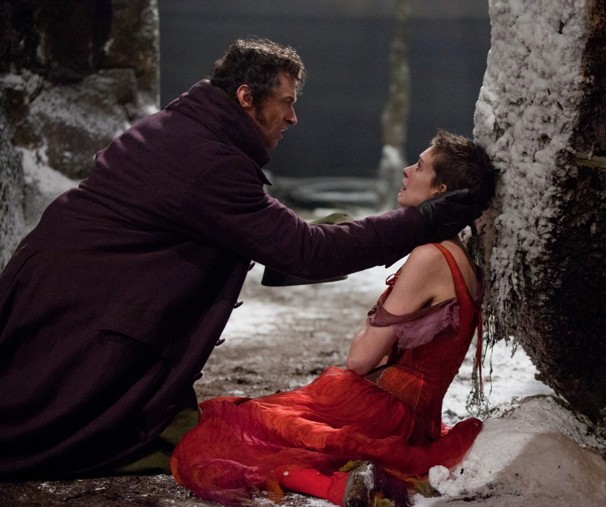 |
| Anne Hathaway as Fantine in Les Miserables |
Some writers, like professor Stacy Wolf, have enjoyed yet criticized the film adaptation of Les Miserables for not being feminist enough and turning the female characters into “bit players.” While others have lauded its feminism. Sure it irks me yet another film focuses on the journey, salvation and redemption of a man. We clearly have enough of those. But that ignores the importance of women in Les Mis. It ignores how, as Bitch Flicks writer Leigh Kolb astutely points out, a film featuring poverty and class struggles is feminist.
Sure the numbers 24601 will always be synonymous with Jean Valjean and the cruel incarceration he faced for stealing a loaf of bread. And yes, I love the standoff between Valjean and Inspector Javert or the passion of Enjolras at the barricades. But the person who has haunted me the most throughout the years? It wasn’t any of the men. It was Fantine.
Fantine also illustrates the plight of single mothers. Single mothers are 5 times as likely to be in poverty, many working in low-wage jobs without paid sick leave. Fantine struggles to make ends meet to pay for Cossette who lives with the greedy and villanious Thenardiers, at the expense of her own health as she eventually gets ill with tuberculosis.
Anne Hathaway tried to relate to her character but couldn’t as their lives wildly diverge. But she realized that while Les Mis is a period piece, it parallels the struggles women face today, particularly with Fantine being forced into sexual slavery. Hathaway (who has come out in support of the One Billion Rising campaign to fight violence against women) said:
“There was no way I could relate to what my character was going through. I live a very successful, happy life. I don’t have any children that I’ve had to give up…or keep. So I tried to get inside the reality of her story as it exists in our world. And to do that, I read a lot of articles and watched a lot of documentaries and news clips about sexual slavery. And for me, and this particular story, I came to the realization that I had been thinking about Fantine as someone who lived in the past, but she doesn’t. She’s living in New York City right now, probably less than a block away. This injustice exists in our world. So every day that I was her, I just thought ‘This isn’t an invention. This isn’t me acting. This is me honoring that this pain lives in this world.’ I hope that in all our lifetimes, we see it end.”
“Her framing of Fantine as a sexual slave, NOT a prostitute, is key, as it refuses to glorify or joke about what is so often swept under the rug regarding sex work: that the majority of women do not “choose” it but are forced into it.”
Traditionally, people view the sex industry in two ways. There exists a range of ways to be in it, either by choice, circumstance or coercion, but regardless it’s work and we must make it safe for sex workers and regulate disease. Or the sex industry is a form of violence against women and girls, exploitative and a form of gender-based violence.
Choice is the keystone in the argument. Do people choose sex work? Or are they forced into it via trafficking? Or do they choose it only because they have no other options or means to earn a living, negating its categorization as a “choice?”
Some assert Les Mis suffers from outdates gender roles and gender stereotypes. Sure it’s set in 1810s-1830s Paris and Victor Hugo wrote it in 1862. But that doesn’t mean we can’t or shouldn’t critique Les Mis through a current lens, especially considering the film is current. But I don’t think Les Mis is chained to the past.
Sexual slavery and oppression aren’t merely in history books. Women today face poverty, trafficking, domestic abuse, rape, assault. Even if we don’t personally confront these struggles, we all must deal with binding constrictions of sexism and rape culture, which Les Mis illustrates.
When Anne Hathaway infamously (and awesomely!) shut down Matt Lauer’s douchebaggy slut-shaming on the Today Show after paparazzi took a crotch shot of her, she said:
“Well, it was obviously an unfortunate incident. Um, I think — It kinda made me sad on two accounts. One was that I was very sad that we live in an age when someone takes a picture of another person in a vulnerable moment and, rather than delete it, and do the decent thing, sells it. And I’m sorry that we live in a culture that commodifies sexuality of unwilling participants, which brings us back to Les Mis, because that’s what my character is — she is someone who is forced to sell sex to benefit her child, because she has nothing and there’s no social safety net. And I— Yeah, so, um, so let’s get back to Les Mis.”
Les Mis also sheds light on rape culture. After Fantine fights back against a man harassing her, putting snow down her dress, she’s the one punished, not the assailant. Inspector Javert wants to arrest Fantine, reinforcing a victim-blaming rape culture which criminalizes and demonizes women’s behavior and punishes victims/survivors, rather than the perpetrators of abuse and assault. With the global rape epidemic now taking center stage — Steubenville, Jyoti Singh Pandey in India, Notre Dame’s rape cover-up — we must question how we as a society perpetuate and enable violence against women.




He called her connecting unwilling participants in sexual commodification to her role as ‘creative’, like it’s a big leap to connect the two. What an ass. It’s one of the most eloquent straightforward answers I’ve ever heard a movie star give for a role.
Oh please; I’m an unrepentant feminist, but comparing the horrors of the life of a 19th Century prostitute to that of a wealthy, self-important A-List actress who dons a designer gown with a slit and decides not to wear underpants when she knows she’s going to be exiting limos outside of which papparazzi are posted is quite the stretch! Give me a break.
Seriously, we’re gonna play this game? Okay well the women in the movie Les Miserables were only given bit parts because the women in the book had bit parts. This has in no way anything to do with sex trafficking because Fantine was originally a prostitute and chose to go back to it. I read the book so I know what I’m talking about. All the other complaints are completely irrelevant, it was a book, a great book get over it. if you really want to achieve equality in this story, go to dig up Victor Hugo and take it up with him.